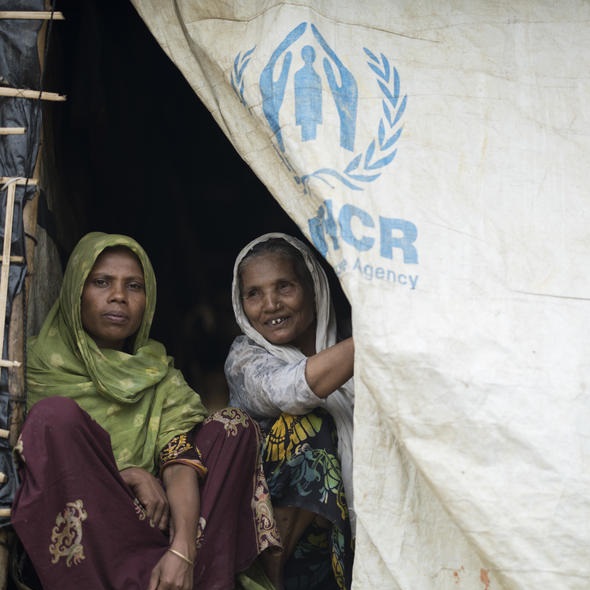Multi-sector Rapid Needs Assessment and Post-Distribution Monitoring of Cash-Based Intervention - Round 1, May 2020
Thailand, 2020
Get MicrodataIdentification
UNHCR_THA_2020_RNA_Q2_v2.1
Multi-sector Rapid Needs Assessment and Post-Distribution Monitoring of Cash-Based Intervention - Round 1, May 2020
| Name | Country code |
|---|---|
| Thailand | THA |
The Rapid Needs Assessment (RNA)/Cash-Based Intervention Post-Distribution (CBI PDM) Monitoring Household Survey was conducted in Thailand in May 2020. The RNA and PDM were designed as a phone-based survey targeting urban refugees and asylum seekers in Thailand to assess their needs and evaluate the effectiveness of the CBI program in light of COVID-19.
UNHCR Thailand and its partners work to ensure that the protection needs of urban refugees and asylum seekers are met during the COVID-19 pandemic. Having observed increased levels of vulnerability relating to restrictions on movement, loss of livelihood opportunities and access to healthcare, the RNA aims to strengthen the understanding of the situation, need and vulnerabilities of the forced displaced population. This survey focuses on COVID-19 knowledge, experience, behaviour and norms, health, education, employment and access to basic necessities. The findings aim to provide evidence to evaluate and design protection and programme interventions.
Since May 2016, UNHCR Thailand has been using multi-purpose CBI PDM to provide protection, assistance and services to the most vulnerable refugees in the urban areas. The number of urban refugees approaching UNHCR for financial support has more than doubled since the onset of the COVID-19 pandemic. To ensure that UNHCR’s multi purpose CBI framework for urban refugees in Thailand is effective, the monitoring was conducted simultaneously with the RNA. PDM is a mechanism to collect and understand refugees' feedback on the quality, sufficiency, utilization and effectiveness of the cash assistance. The findings of the PDM support the assessment of the impact of CBI for urban refugees in Thailand affected by the COVID-19 pandemic and the appropriateness of funding levels, distribution modalities and the use of cash to support refugees.
Sample survey data [ssd]
Households
Version
v2.1: Edited, anonymous dataset for licensed distribution.
Scope
The suvey was designed as a multi-sectoral assessment to be administered as a phone-based interview to be completed in 60-90 minutes. The rapid assessment was not designed with the intention of producing comprehensive and detailed information on the various topics included.
The household survey covers the following parts and sections:
PART 1: Rapid Needs Assessment
- Household demographics
- Knowledge and experience of COVID-19
- COVID-19 Behaviour/Social Norm
- Health
- Education
- Employment
- Markets and prices, coping strategies and expenditure
- Receiving assistance and support (non-CBI)
PART 2: Post-Distribution Monitoring
- Receiving and spending the cash assistance (basic facts)
- Risks and problems: Did people face problems with the CBI? Did the CBI put POCs at additional risk?
- Markets and prices: Can POCs find what they need, and at a price they can afford, in the markets?
- Expenditure: What did people spend the money on?
- Outcomes: What changes is the cash assistance contributing to in POC households?
- Longer-Term Outcomes: Has the cash assistance helped put POC on the pathway to sustainable solutions?
- Accountability to Affected Persons: Is the CBI intervention accountable to persons of concern? (What preferences do people have over how assistance is delivered?)
POC = Persons of Concern to UNHCR
| Topic |
|---|
| Livelihood & Social cohesion |
| Cash Assistance |
| Domestic Needs/Household Support |
| Income Generation |
| Solutions |
| Basic Needs |
Coverage
The survey covers all urban refugees and asylum seekers.
Producers and sponsors
| Name |
|---|
| UNHCR |
Sampling
The two parts of the survey were sampled differently as their sampling universe differs. Both samples were drawn from UNHCR's registration database:
- Post-Distribution Monitoring: The total number of beneficiaries households of Cash-Based Interventions in April 2020 was 5,124. For this part of the survey (CBI PDM), a random sample of 89 refugee households was drawn from all vulnerable urban refugee households registered to receive cash assistance.
- Rapid Needs Assessment: In addition to the 89 sampled households, who were also answering this part of the survey, a random sample of 91 households, who were not receiving cash assisstance, was selected from all urban refugees and asylum seekers registered with UNHCR (5,286).
There were some language barriers for some groups that were intended to survey during the RNA/PDM, in particular Vietnamese Montagnard refugees, who could not speak Vietnamese.Also a Jarai interpreter, who has experience in translating surveysfor UNHCR in Thailand was not able to translate the survey. Eventually, these sampled households were dropped and replaced with respondents, who could speak Vietnamese. It is worth noting that there is a large portion of Vietnamese Montagnard, who cannot speak Vietnamese among the urban refugee and asylum seeker population in Thailand (up to 30%). In addition to the described language barriers, few Vietnamese Montagnard refugees also were not able to respond to interview questions due to health issues.
The PDM/RNA was conducted during Ramadan period, which led some participants to be unavailable for the survey, while other interviews were started, but could not be completed. The number of respondents that could not be reached was more than double (30%) in comparison to what was initially planned (10-15%), which was attributed to both Ramadan, but also the COVID-19 situation.
Sample weights were calculated for each of the two parts of the survey differently, as the inverse of the probability of selection of the household.
Data collection
| Start | End |
|---|---|
| 2020-05-15 | 2020-05-26 |
| Name |
|---|
| UNHCR |
Data Access
| Name | Affiliation | |
|---|---|---|
| Curation Team | UNHCR | microdata@unhcr.org |
UNHCR (2020). Thailand: Multi-sector Rapid Needs Assessment and Post-Distribution Monitoring of Cash-Based Intervention, Round 1 May 2020. Accessed from: https://microdata.unhcr.org.
Metadata production
| Name |
|---|
| UNHCR |
2021
Metadata version
v1.0
